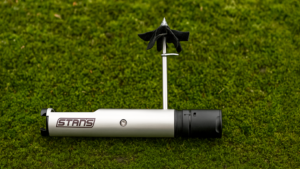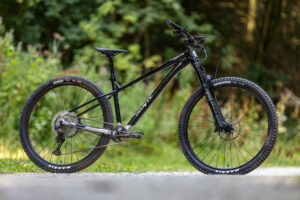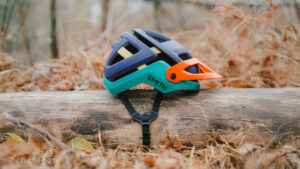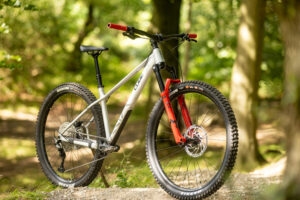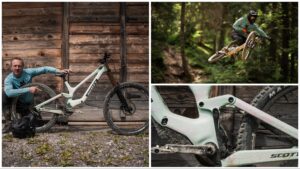Better tyres, brakes and settings from Norco's Ride Aligned setup guide would definitely help elevate the performance of the Fluid VLT C2.
Norco’s Fluid VLT C2 140 is lumberjack-solid, but this Bosch SX-equipped Canadian shredder needs some urgent upgrades to log a top rating
Most mountain bike brands like to have one suspension design to hang their hat on. Not Norco. Instead, it prefers to switch between different layouts depending on the application and the most desirable suspension traits for each specific platform. As such, the Shore Park, with 190mm travel, uses a high-pivot four-bar design that Norco has dubbed VPShp, while the Revolver XC bike uses a more traditional four-bar design with the shock under the top tube. The point being, Norco doesn’t use a one-size-fits-all approach when it comes to suspension.
– Short of time? Click here to skip to the verdict –

Norco’s VPS four-bar suspension is used on the Fluid VLT C2 140.
It makes sense then, that the Fluid VLT, with 140mm travel and MX wheels, shares the same VPS four-bar layout as the analogue Fluid, albeit with a beefed-up frame to deal with the extra weight and power of the Bosch SX motor and 400Wh internal battery.

Norco keeps its branding discrete on the top tube of the good-looking Fluid VLT C2.
Frame and geometry
The new Fluid VLT is still a sleek looking bike, and there are three frame options to choose from depending on budget. You can have a full aluminium frame to save some cash, or a full carbon frame to save weight. The third option is the one I have here: the Fluid VLT C2, which seamlessly blends the carbon front triangle with an alloy rear end. So technically, it’s not a carbon bike at all, and should probably be called the CA2, if I was being pedantic.

The Fluid VLT C2 140 combines a carbon front triangle with an alloy rear end
Now, I don’t think for a second that Norco is trying to fool anyone with the naming, because when I weighed the Norco it was 19.9kg, which is identical to Norco’s claimed weight, even with our Continental control tyres fitted. And for accuracy, I weighed the exact amount of sealant in all of the tyres in this test. And if you want to know the true weights of all eight bikes in our 2024 SL E-bike of the Year test, be sure to check out the dedicated weigh-in video.

A trunnion mounted shock and beefy rocker link make for a solid package.
As the model name suggests, the Fluid VLT 140 C2 has 140mm travel, but Norco also offers a 130mm version that gets an inline shock and a lighter build kit to save precious grams. Regardless of the frame material, or suspension travel, all of the Fluid VLTs benefit from Norco’s Ride Aligned setup guide. This web-based application allows you to choose your preferred suspension feel – soft to firm –and choose trail grip and type, before spitting out setup suggestions for stem height, bar width, tyre pressures, and most importantly, fork and shock pressures and damping settings. It is a great resource and starting point, especially for the more complex Fox Float X2 shock on the Fluid VLT C2 140. But as I quickly found out, the bike felt over-damped and too harsh with Norco’s suggested settings. More on this later.

Norco’s Ride Aligned set up guide was giving out mixed messages
The Fluid VLT frame is designed exclusively for a 27.5in rear wheel, and comes in five unique frame sizes, S1 to S5. The two smallest sizes get super-short 432mm chainstays to balance the weight distribution and help offset the forward position for the 400Wh battery. Then, as you go up the size range, the chainstay lengths get progressively longer, where the S3 grows to 436mm, S4 is 440mm, and S5 is 444mm. So still pretty short across the board, when compared to the 453mm rear ends on the Cannondale Moterra SL 1 or Whyte E-Lyte 150 RSX in this test.

Short 435mm chainstays on the size S3 Norco Fluid VLT C2
All five sizes share the exact same rear ends, so the different rear centre lengths are actually determined by the pickup points of the suspension links on the front triangle, not the actual length of the chainstays themselves. And what’s really cool about the different rear centre measurements, is that all of the bikes, regardless of size, will offer riders a similar weight distribution and handling across the size range.

Great angles and dimensions on the Fluid VLT C2 make it an easy bike to ride.
Now, if you compare my measured geometry with that listed on Norco’s website, you’ll notice that our test bike has a slightly shorter reach, longer wheelbase, slacker head angle and lower bottom bracket height than claimed. It’s not a mistake though, and the explanation is simple. I measure the geometry of all the test bikes with the negative spring in the shock charged, because you can’t ride the bikes any other way. This in turn pulls the shock into its travel ever so slightly and accounts for the slacker, lower geometry.

The 2024 Norco Fluid VLT C2 140 hides the Bosch SX motor and 400Wh battery well.
Norco Fluid VLT C2 Need to know
- 140mm travel SL e-bike
- Carbon/alloy frame
- Dedicated MX wheel format
- Bosch SX motor and 400Wh battery
- 150mm travel RockShox Lyrik fork
- Proportional chainstays
- SRAM GX AXS T-type transmission
- TRP Trail Evo 4-piston brakes
- 2.4in Continental tyres
- Weight 19.9kg
- Range: 861m vertical
- Sizes S1 to S5
Motor and battery
Norco has taken a similar approach to the Whyte E-Lyte 150 for its drive unit. It uses a Bosch Performance Line SX motor with 55Nm torque and 600 watts peak power. The Bosch Compact Tube 400Wh battery keeps the lights on, and with an 85kg rider you’ll get about 861m of climbing in turbo mode on a single charge – that’s what I achieved in my range test. You can also fit a 250Wh PowerMore range extender, but due to Norco’s suspension layout, Bosch’s 1.5kg power pack won’t sit anything like as low in the frame as it does on the Whyte. So it will impact the handling more. Interestingly, there’s currently no opinion to add a range extender into the Ride Aligned setup guide.

With 55Nm torque and 600 watts peak power, is the Bosch SX motor still mid-power?
The Bosch SX motor on the Norco made some strange whining noises. Sometimes it was really quiet, other times it was really loud. In fact, there seems to be a lot of variation in noise levels across the three Bosch SX bikes in this test, where frame acoustics and quality control both clearly play a part in causing the differences.

No fancy display here, just colourful lights and five bars.
Again, the basic Bosch traffic light LED display that’s embedded in the top-tube is all most riders need or want. But given that Specialized has had a proper e-bike screen for over three years now, it really is about time Bosch caught up.

The wireless Bosch Mini remote is neat, but the button cover is easily damaged.
I like how the Bosch wireless Mini Remote keeps the cockpit tidy, but the rubber cover that protects the buttons is quite easily damaged, especially when you’re pulling a 20kg bike out of the car in a hurry, because you’re afraid your back could give way at any moment. So again, this could be improved.

Strong thumbs, or a tyre lever, are needed to open the cover on the charging port
And one final niggle that’s unique to the Norco, is that the charging port cover at the base of the seat tube is super hard to open. So much so, I was actually worried that I was going to break it the first time I tried to charge the bike. I also had to use a tyre lever to release the latch, so good luck doing that with cold hands. I suppose, at least it’s secure and well sealed.
Suspension
Given the four-way damping adjustability of the Fox Float X2 Performance Elite shock, I was super happy to have suggested settings from the Ride Aligned setup guide to get started. Based on my weight, height and frame size, Ride Aligned spat out the spring pressure and high/low-speed compression and high/low-speed rebound settings for the shock in a just a few milliseconds.

The Norco gets a 150mm travel RockShox Lyrik fork.
I was initially happy with the suggested pressures for both the 150mm RockShox Lyrik Select + fork and the Fox shock, as both gave just the right amount of sag. In contrast, Norco’s recommended damping for both the shock and fork felt very heavy-handed. This made the dynamic geometry super stable and consistent on chunky terrain, but the bike felt harsh, deflected off line too easily, and seemed lifeless and heavy. Dare I say it, my initial impression of the Norco was that it rode more like a full power e-bike, albeit without the power and range. Not the best endorsement for an SL e-bike, right?

All the bells and whistles: Just don’t be afraid to play your own tune on the Fox Float X2 shock.
So the first thing I did, after fitting the softer compound Continental Kryptotal control tyres, was to start backing the damping off on both the fork and shock. I also took the air can off the Fox Float X2 shock just to check the number of volume spacers, because the suspension also felt quite progressive. But there were none inside, and I could have saved myself the hassle, because that info was staring me in the face on the Ride Aligned web page. Doh!
Components
Norco has made two basic mistakes with the build kit on the Fluid VLT C2. So let’s address them separately, even though they are inextricably linked. First up, the chunky knobs on the Continental Kryptotal and Xynotal tyres may look the part, but the harder Endurance compound does absolutely nothing to boost rider confidence on the trail, regardless of the conditions. Sure, they boost the range of the bike, and will probably never wear out, but if you want to get the best performance out of the Norco, the stock Conti tyres have to go – I’d recommend the Soft or Supersoft compound instead.

The stock Continental tyres simply didn’t cut it on such a capable SL e-bike – it’s crying out for a softer compound.
Now for the second mistake. If you have limited tyre traction on a 19.9kg bike with progressive geometry and good suspension, you sure as hell better have great brakes. Sadly, that’s not the case here. Yes, lever feel and modulation are both good on the four-piston TRP Trail Evo units, but they needed a tad more power and seemed to fade on longer runs.

Bigger rotors are needed to up the power of the TRP Trail Evo brakes.
And unlike some of the Shimano brakes in this test, the lever feel was always consistent and solid. It’s just that the power of the TRPs diminished, especially on the rear, where the smaller 180mm rotor had that rainbow-tempered finish after just a couple of rides. So you’ll want 203mm rotors front and rear at the very minimum to go with your new tyres. And If you’re over 95kg, you’ll need 220mm rotors, or better brakes.

Separate clamps are always better, where shifting is involved.
One advantage of using the TRP brakes, is that Norco has kinda been forced to use the separate SRAM Infinity AXS shifter clamp, which makes it way easier to get the pod exactly where you want it. Shifting is really quiet and smooth with the T-type GX AXS transmission. And while SRAM AXS T-type gears can feel sluggish on a full power e-bike – where you get up to speed that much faster – the shift speed seems fine for a mid-power e-bike like the Norco..

Our test bike had a 150mm dropper, but comes stock with a 170mm post.
The size S3 Fluid VLT has a short 425mm seat tube, and my test bike came with a 150mm post fitted by mistake, instead of the correct 170mm, which explains why I have so much exposed post sticking out of the frame that could have been used to increase the drop. Also, the alloy handlebar has a slightly goofy profile, with too much back-sweep, so I had to roll it forward more than I would have liked just to get it to feel right. Still, the bar has a generous 800mm width, so most riders could totally live with the profile, unless you’re super fussy like me.
Performance
The overall riding position on the S3 Fluid VLT felt absolutely spot on with the 470mm reach. Yes, the shorter rear end makes the bike feel a little smaller, but you could easily up-size to the S4 if you wanted something with better straight-line stability, because the seat tube on the next size up is still only 445mm tall.
Climbing
Short chainstays and a 343mm BB height make the front end of the Norco easy to pop, but the flip-side is that they also make it harder to keep it planted on steep climbs. So it’s good that the Norco has a steepish 76.9º seat tube angle that helped keep my weight forward on the climbs. Also, this is one bike where you’ll want to make sure you have the nose of the saddle pointing down just a touch, to improve the seated climbing position further.

Spin to win with the Bosch SX motor to maximise the power output on the climbs.
And because the suspension is active, traction on the rear is good when climbing – well, at least once I swapped out the tyres. So, when I could keep the pedals and the Bosch SX motor spinning at a high RPM, I could still tackle pretty serious gradients on the Norco. Just don’t expect it to go up climbs anything like as easily or as quickly as the Shimano EP801 equipped Orbea Rise LT that’s also in this SL shootout.
Descending
Short chainstays cut both ways, though. So it’s super-easy to pop a manual on the Norco. The tight back end makes slicing through, or slapping turns, easy too. So altogether the Fluid VLT is a fun, solid bike, designed with shredding in mind. Well, at least once you swap the tyres. Have I already mentioned that the stock compound is way too hard?

With short chainstays, the front end is easy to unweight, even mid-turn.
Norco’s contact points are also good. The grips are nice and the Fizik Terra Aidon saddle is comfortable when seated, but the pointy edges at the widest part of the saddle occasionally dug into the inside of my thighs on off-camber trails, so it’s not quite perfect. Maybe, if the bike had come with the correct 170mm dropper that wouldn’t even have been an issue.

Opening up the damping settings on the Fox Float X2 shock give the bike more pop and traction.
Deviating from Norco’s suggested suspension settings really helped breathe life into the Fluid VLT, giving it dynamism that was previously lacking. In short, I increased the pressure in the shock a touch and opened up the compression and rebound damping settings, so I was riding more on the spring. And that’s the real beauty of a shock like the Fox Float X2 – all of these tuning options are at my fingertips, using nothing more than a multi-tool.

With less damping, the Norco Fluid VLT C2 also had more grip, and reduced harshness.
These simple changes made the suspension more sensitive and reactive, where the settings seemed to work better with the super-solid frame. It also made it way easier to move the bike around and get the wheels off the ground, which is exactly what I want on an SL e-bike. An additional benefit to the slightly higher shock pressure, was that it also improved the riding position for climbing. Even if that wasn’t the end goal.

Softer compound Continental tyres not included, but the Norco Fluid VLT C2 140 definitely needs them
Verdict
Norco has all the makings of a great SL e-bike in the Fluid VLT C2 140. It has a comprehensive size range, good geometry with proportional chainstays, all wrapped up in a solid chassis that seamlessly blends a carbon front end with an alloy rear. The Bosch Performance Line SX motor is powerful and reliable, but it did make some weird sounds on the Norco. And even though the Norco is only a 140mm bike, I liked how the big Fox Float X2 shock gives it a good suspension response and a wide range of tuning options. Which meant I could really transform the character of the bike from planted to poppy, with just a multi-tool. In such a competitive category however, Norco can’t afford to make rookie mistakes like the hard compound Continental tyres and under-powered TRP brakes. Yes, the tyres and rotors are both easy upgrades, but when brands like Whyte are ticking all of the boxes for you, the small details really start to matter.









